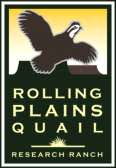New Research to Explore Potential Treatments for Quail Parasites
OutdoorHub 11.08.13

The Rolling Plains Quail Research Foundation (RPQRF) has announced a new study in its ongoing effort to stem the decline of the region’s native wild bobwhite quail. On October 24, The Foundation’s board committed $781,362 to a study called “Treatment of Eyeworms and Cecal Worms in Bobwhites: Clinical and Field Studies” that will be led by Dr. Ronald J. Kendall, Professor of Environmental Toxicology at The Institute of Environmental and Human Health (TIEHH) at Texas Tech University. The project will involve scientists from TIEHH, Texas A&M University-Kingsville and the Rolling Plains Quail Research Ranch. This research will be part of “Phase 3” of the RPQRF’s “Operation Idiopathic Decline” (OID). Now in its third year, OID is the largest, most comprehensive research study of disease and contaminants in quail ever conducted. The RPQRF has brought together researchers from Texas A&M, Texas Tech University and Caesar Kleberg Wildlife Research Institute to work on the project being conducted in 25 counties across Texas and 10 counties in Oklahoma.
The objective of this latest phase of research is to evaluate methods to control eyeworms and cecal worms in native bobwhite quail and evaluate efficacy of treatments in laboratory and field settings. Wildlife biologist Dr. Dale Rollins, executive director for the RPQRF’s Rolling Plains Quail Research Ranch explains, “Since 2009, we’ve been intrigued by the prevalence and potential impacts of two parasitic worms to quail. Our last three years of intensive study through OID have only heightened our concern, especially relative to the eyeworm,” said Dr. Rollins. “These are not microscopic worms. Many of the birds we examine have more than 10 worms in their eyes; one bird harbored 82. As critical as good vision is for a quail, we seek to take the next step and determine what our control options may include.”
Rick Snipes, who serves as board president for the Rolling Plains Quail Research Foundation observes, “Hopefully, this phase of our research will lead us to some real, solid answers about how to deal with these parasites. I am convinced they were the cause of the devastating loss of quail on our ranch during the summer of 2010, since neither weather nor habitat could possibly have played a role in that catastrophe. At last there is real hope that we may be close to answers. All bird hunters and land stewards will benefit from the work being funded by the Rolling Plains Quail Research Foundation.”
Leading the study that will delve more deeply into the effects of parasitic infections and treatment options is Dr. Ron Kendall, a pioneering environmental toxicologist who has studied wildlife since the 1970s. The work will be implemented in the Wildlife Toxicology Laboratory, TIEHH, Texas Tech University. Dr. Kendall notes, “The research support from the Rolling Plains Quail Research Foundation has been outstanding in assisting us in expanding our investigation into the role of parasites on the health of bobwhite quail. We have been particularly intrigued by parasitic nematodes and their potential impact on quail health and survival. This increased research support will assist us in expanding the science necessary to evaluate the degree of infected quail survival and reproductive capabilities, in addition to developing methods for control of these parasitic nematode infections. The goal is sustainable wild bobwhite quail populations.”

